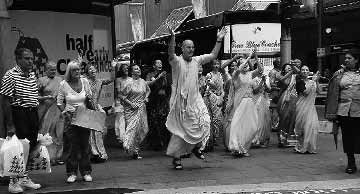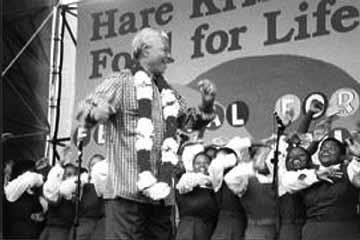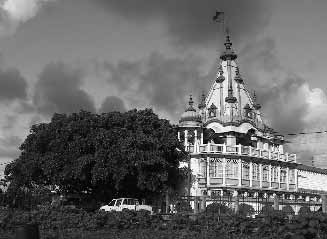By Indradyumna Swami
| January 1 – February 5 , 2006 |
After my preaching tour in South America, I flew to Australia via London, a grueling 32-hour trip. I rested in Sydney for a few days and then joined in a week of festivities at the temple. Then I took another long-haul flight, this time to South Africa.

When I arrived in Durban, I was so exhausted I didn’t know whether I was coming or going. Worse yet, the next morning I began to feel a familiar, dull pain in the right side of my abdo-men. A visit to the doctor confirmed my suspicion: my liver was swollen again.
“What do you expect?” said the doctor. “You barely gave your-self time to recover and you were off traveling around the world again.”
“It’s hard to sit still, Doctor,” I said. “There’s so much service to do.”
“That may be,” he said, “but your body is telling you something else. Better get some rest again, or you’ll suffer the consequences.”
On the way back to the temple I thought about his advice. I did not want to stop my service again, but there seemed to be no choice. I considered resting in Durban, but I cringed at the thought of lying low again for weeks on end. Suddenly, I remem-bered an invitation from my Godbrother BB Govinda Maharaja to visit Mauritius should I ever need some rest. I called Maharaja immediately. He said he would also be there soon and suggested we could do programs together each evening. I liked the idea of preaching while I recuperated, so I booked a flight to Mauritius, and a sympathetic devotee bought a business-class ticket for me.
I boarded the flight a few days later, looking forward to the peace and quiet of the business-class cabin, but a traveling preach-er’s life often brings surprises, and that day was no exception.
As soon as I entered the cabin, a large group of passengers seated together started laughing at me. They looked like tourists and seemed a bit drunk.
Several of them nudged their friends who hadn’t seen me, and the friends also made fun of me.
I tried not to pay attention, but as I was putting my bags in the overhead luggage compartment, one of them said in French, “Cute dress he’s wearing.” I replied in French. “I’m a monk, Sir,” I said. “These are my robes.” He looked surprised. “You’re not a monk,” he said. “You’re dressed like a clown.” The entire group laughed wildly.
I looked away and sat down in my assigned aisle seat, which unfortunately was just in front of him and two others in the group.
At that moment a stewardess came around with glasses of juice. First she served the men behind me, and with one glass left on the tray turned to me.
As I leaned forward, one of the men reached over the seat and took the glass.
“Good one!” said one of his friends across the aisle. I expected the stewardess to intervene, but she turned away and came back two minutes later with another glass.
After a while the tourists began laughing again. “Maybe he’s a she,” said a man loudly. Again his friends burst out laughing. I struggled to control my anger. “Be tolerant,” I thought. “They’re just a bunch of drunks.”
One of the men went to the restroom. On his way back to his seat, he stopped next to me. With a remorseful look on his face he put out his hand. “I’m sorry for the way my friends spoke to you,” he said. As I put my hand out to shake his, he grinned and pulled his hand back. Once again his friends could not contain themselves. I’d had enough. I decided to go to the cockpit and complain to the captain, but as I was getting up, the man directly behind me pushed my seat forward with such force that I fell onto the back of the seat in front of me. “Clown!” he yelled. I turned to confront him, but just at that moment, four security guards walked into the cabin. Everyone looked up. A hush came over the entire cabin. The guards stood, silently surveying the passen-gers for a few moments, and then turned to speak quietly with the people sitting in the first three rows, apparently asking them to move. The passengers stood up and the stewardesses escorted them to the last few rows in business class, which were empty.
When the passengers had been relocated, the security guards took one last look around and then were gone as suddenly as they had appeared.
After a few seconds, another two security guards came in. They stood silent and motionless. Suddenly, Nelson Mandela and his wife came into the cabin, followed by several aides. All the passengers gasped. Mr. Mandela casually looked around. When he saw me, he broke into a smile.
“Hello,” he said, giving me a little wave and nodding his head.
I stood up. “Mr. President,” I said. I started to move towards him to shake his hand. From the corner of my eye, I saw some of the passengers who had been teasing me. Their mouths were open in surprise. One of the bodyguards stepped between Mr. Mandela and me. “I’m sorry, sir,” he said politely but firmly.
I stopped, but I was pleasantly surprised when the same body-guard led Mr Mandela to an aisle seat almost opposite me, just one row in front. The aides took the seats that had been cleared in the first three rows.
Mr. Mandela sat down. Then he looked back and smiled at me again.
“Mandela smiled at him,” said the man in the seat behind me. I could not tell whether Mr Mandela remembered me personally or was simply acknowledging me as a Hare Krsna devotee. In 1992, when he was leader of the African National Congress, he visited our temple in Durban and humbly bowed before the form of Srila Prabhupada. He was given a tour of the temple and was served a feast at Govinda’s restaurant.
At Diwali in November 1994, he came to the temple again, this time as the president of the country, accompanied by an en-tourage of ministers.
Thousands of locals thronged to the temple to hear his ad-dress to the community.
In April 1997 he was once again the temple’s special guest at our Festival for the Children of the Rainbow Nation, held at a large soccer stadium in Durban. It was an extravaganza with eth-nic groups performing, including our devotees who held kirtan. We had invited 50,000 schoolchildren, hundreds of teachers, 50 members of Parliament, the Mayor of Durban, and the King of the Zulus. Devotees distributed lunch packets to each and every child. President Mandela even cancelled the rest of his day’s ap-pointments to stay longer at the program.

Afterwards, as I escorted him back to his car, we talked about the need for spirituality in modern society. Just before he left, he turned to me. “Maharaja,” he said, “this was the best day of my life.”
The next day his words appeared in the headlines of one of the country’s biggest newspapers.
During the four-hour flight to Mauritius, Mr. Mandela looked back several times and smiled graciously at me. I smiled in return each time, acknowledging his kindness.
After landing, he was quickly escorted from the plane, but he turned once more and waved at me.
As I was leaving the plane, I met the captain. “Do you know why Nelson Mandela has come to Mauritius?” I asked. The cap-tain smiled. “For a vacation,” he said, “just like the rest of you.”
As I walked to immigration, I thought about the captain’s words. They were almost accurate but not quite. It was true we had all come for a rest, but whereas the others had come to put their work aside, I had come to get back to mine. I would be counting the days until I could take up my normal service.
Some devotees picked me up at the airport, and as we drove to the beach house where I would spend two weeks recuperating, I was surprised to see that Mauritius had changed dramatically since my first visit, in the early 1980s. The old dirt roads were now paved with asphalt and lined with proper road signs and modern petrol stations.
But the island was still the paradise immortalized by the words of Mark Twain: “First God saw Mauritius, then He created heaven.” Amidst the endless sugarcane fields, I caught glimpses of tropical fruit trees: mangoes, litchis, mandarins, oranges, grape-fruit, papayas, passion fruit, jackfruit, guavas, and custard apples. Beautiful white sand beaches with clear blue water encircled the island.
“It’s not the lazy island I remember,” I said to my driver. “In many ways it still is,” he said, “but things have changed. The economy has improved much during the past 10 years, with a surge in demand for Mauritius sugar, and there is a new textile industry.
“You won’t recognize Port Louis,” he continued. “The capital now has its own share of big buildings, hypermarkets, car-parks and a well-groomed downtown area. There is all facility to spread Krsna consciousness, and fulfill Srila Prabhupada’s prediction for Mauritius.”
“What prediction?” I asked.
“Srila Prabhupada visited Mauritius twice and predicted it would be the first Krsna conscious country in the world,” he replied.
“He did?” I said.
The driver smiled. “Oh, yes,” he said.

“Is he hinting that I should preach in Mauritius?” I thought. “Hmm… Maybe I could… but then, I have my festival programs. I can’t get involved here.”
I decided to change the subject. “How are the poli-tics in the country?” I said. “What’s our relationship with the government?”
“There are just over a million people in Mauritius,” he said. “Two thirds of the population is of Indian origin, and most of them are Hindus. The prime minister was the special guest at our farm community for the opening of our Krsna Balarama temple in the year 2000.” We entered the driveway of the beach house. “Maharaja,” he said,“Did you know there’s not a single poisonous insect or reptile on the island. It’s a…”
“Paradise on earth,” I broke in. He smiled.
As I was settling into my room, I looked out the window at the turquoise-blue water just off the beach, 15 meters away.
“Preaching in paradise,” I joked to myself. “That would be some-thing new. I’m always preaching in tough spots, like Russia, Poland, and the Balkans. At least there won’t be any danger here, like skinheads, anti-cult groups, or religious fanatics.”
I paused for a moment and let my mind sober up. “Don’t kid yourself,” I thought. “Any form of material opulence is dangerous for a sannyasi.” I looked out again at the heavenly scene. “And don’t forget it,” I said softly.
I fell asleep quickly that night, listening to the small waves breaking on the beach just outside my window.
I got up in the darkness of early morning and walked the few steps to the beach. As I sat there chanting my japa, the sun rose on the horizon. It was a spectacular scene, with the beautiful rays tinting the clouds orange against the deep blue water of the ocean.
“Hello paradise,” I said, as the sunlight slowly revealed the beauty of the tropical scenery around me. I could not have im-agined a more perfect scene anywhere in the world. It was one of those rare moments where life comes to a standstill in an idyl-lic setting and one becomes calm and peaceful. But a devotee is trained to see the world not through his imperfect physical eyes but through the eyes of scripture. For all its beauty, I knew this environment would fade in time.
The only true paradise is the eternal one, and it remains unaf-fected by the changes of this imperfect world.
paras tasmat tu bhavo ‘nyo
‘vyakto ‘vyaktat santanah
yah sa sarvesu bhutesu
natyatsu na vinasyati
“Yet there is another unmanifest nature, which is eternal and is transcendental to this manifested and unmanifested matter. It is supreme and is never annihilated. When all in this world is an-nihilated, that part remains as it is.”
[Bhagavad-gita 8.20]
After finishing my rounds, I sat reflecting on Srila Prabhupada’s prediction that Mauritius would be the first country to become Krsna conscious. “It would be an honor to help fulfill Srila Prabhupada’s prophecy,” I thought. “Maybe one day I’ll return and do some preaching here. I can’t imagine when that would be, but I’ll keep the option open.”
Although early, it was getting hot, so I walked back to the beach house.
Later that morning my cell phone rang. It was Guru Gauranga das, a disciple of Bhakti Charu Maharaja.
“I sent you an important email several days ago,” he began, “and I haven’t received a reply.” “I’m sorry,” I said. “I’ve been on a tight schedule and haven’t checked my mail for a few days. I’ll get right on it and send you a reply this morning.”
That morning, when I downloaded my email and read Guru Gauranga’s letter, a new chapter opened in my life. Here was a chance to preach in paradise, and to show the people of Mauritius what paradise really is.
Dear Indradyumna Swami,
Please accept my most humble obeisances. All glories to Srila Prabhupada.
I have been keeping up with your travels through your diary. Thank you for taking the time to share your experiences on the road with us.
I heard you are on your way to Mauritius.
As you know, by Krsna’s grace I run a successful business on the West Coast of America. For a long time I have wanted to do some significant service for ISKCON. When I read in one of your recent diary chapters that an astrologer predicted you would take your festival program to several countries, I got an inspiration.
If you would agree to do a large festival program in Mauritius, similar to what you do in Poland, I will provide all the financial backing you need. I will purchase all the necessary materials, including buses, trucks, stages, and tents. I will also buy a piece of land and build accommodation for the devotees in your program, as well as a warehouse to store all your paraphernalia.
I would also like to help the Mauritius yatra by assisting BB Govinda Maharaja in building the new temple in Phoenix. I plan to relocate my business and family to Mauritius in the near future.
I am convinced that a new temple in Mauritius and a festival program such as yours will flood the country with happiness and begin to fulfill Srila Prabhupada’s dream that Mauritius will be the first Krsna conscious country in the world.
I know you have a busy schedule, but I am hoping you will accept my offer and spend one or two months a year in Mauritius doing festivals in all the towns and villages.
Please let me know your thoughts on the matter.
Your servant,
Guru Gauranga das